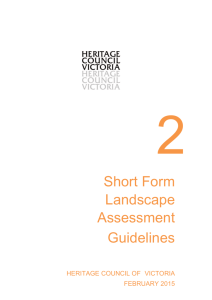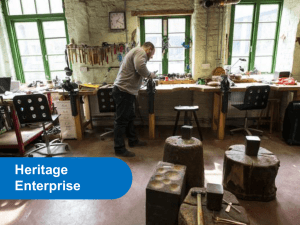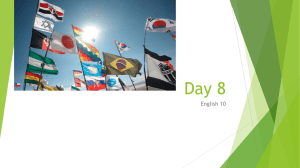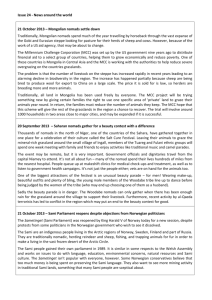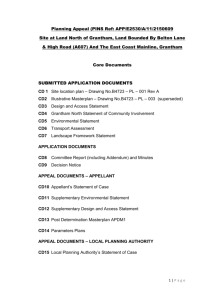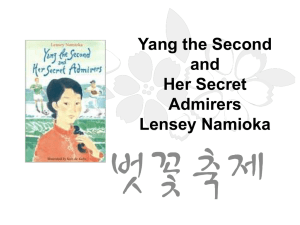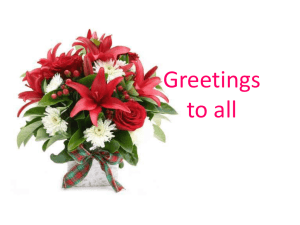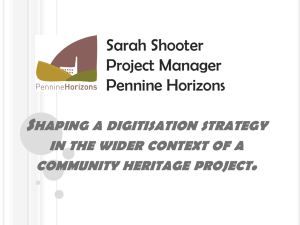Management of the world heritage
advertisement
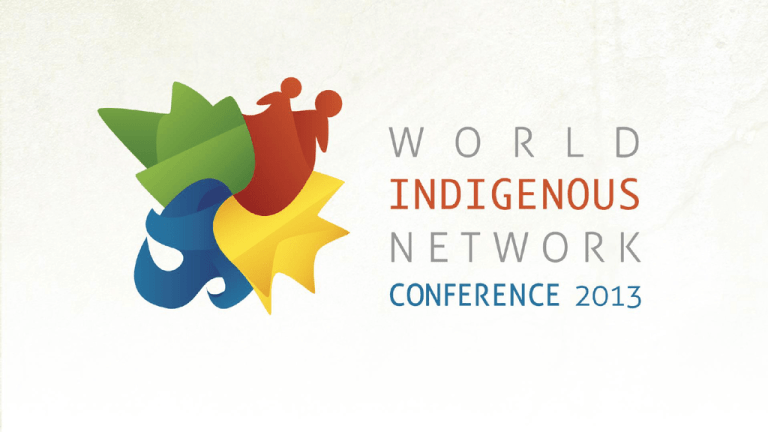
Sweden: a new management of protected areas, where Sami traditional knowledge is of high significance The committee considered that the site is of outstanding universal value as it contains examples of ongoing geological, biological and ecological processes, a great variety of natural phenomena of exceptional beauty and significant biological diversity including a population of brown bear and alpine flora. It was noted that the site meets all conditions of integrity. The site has been occupied continuously by the Sami people since prehistoric times, is one of the last an unquestionably largest and best preserved examples of an area of transhumance, involving summer grazing by large reindeer herds, a practice that was widespread at one time and which dates back to an early stage in human economic and social development. Wilderness is a natural environment on Earth that has not been significantly modify by human activity. The most intact, undisturbed wild natural areas left on our planet – those last truly wild places that humans do no controll and have not developed with roads, pipelines our industrial infrastructure. Wikpedia. Criterion iii, (…) The site is extraordinarily rich in both tangible and intangible heritage, demostrating the long-term sustainable land-use of th Same people Three categories of cultural landscape: - a landscape designed and created intentionally by man. - an organic evolved landscape which may be a´’relict or (fossil) landscape’ or a ’continuing landscape’ - an ’associative cultural landscape which may be valued because of the religious, artistic or cultural associations of the natural element. Wikpedia. So without Sami culture – no world heritage The Sami culture = Laponia world heritage Different themes: - The management plan should have a commun value base - Information/communication/ education - A new management plan – a new way of thinking (human – use- nature and culture) - Preparings for a new management organization - An temporaire organization Holistic view The natures value Reindeerherding and sami culture Traces of earlier users Laponia is an entirety in which the important relationship between human beings and the environment is emphasised. This entirety is an indefeasible heritage that should be passed on to coming generations. The Sami culture lives on and reindeer herding is active in the area while new Sami livelihoods are developed in harmony with the environmental and cultural values that make up the foundation for the World Heritage appointment. The cultural landscape, national parks and nature reserves are preserved and cared for in such a way that their natural value remains, that they continue to be a positive example within cultural heritage care as well as an asset for the development of the attached municipalities. Our visitors’ experiences are enhanced through relevant information and other ventures. 5 concepts for the management - sustainable - wholeness - local participatory – openess - common work - consensus New ways of working: - searvelatnja - consensus - rádedibme - elder’s knowledge Management of the world heritage The World Heritage Laponia is administered in such a way that its natural value is secured for future generations. The World Heritage is an asset for development. The World Heritage Administration is made up of a number of parties, all involved in the care and development of the area. The parties all enjoy a mutual respect of each others’ different conditions and the administrative work is a dynamic learning process (searvelatjna) which is constantly developed but where the value-system remains a strong foundation. Laponia tjuottjudus is a role model for the administration of cultural heritage sites. Conclusions: - traditional knowledge should be incorporated - local management – state included consensus - new methods to do the work

